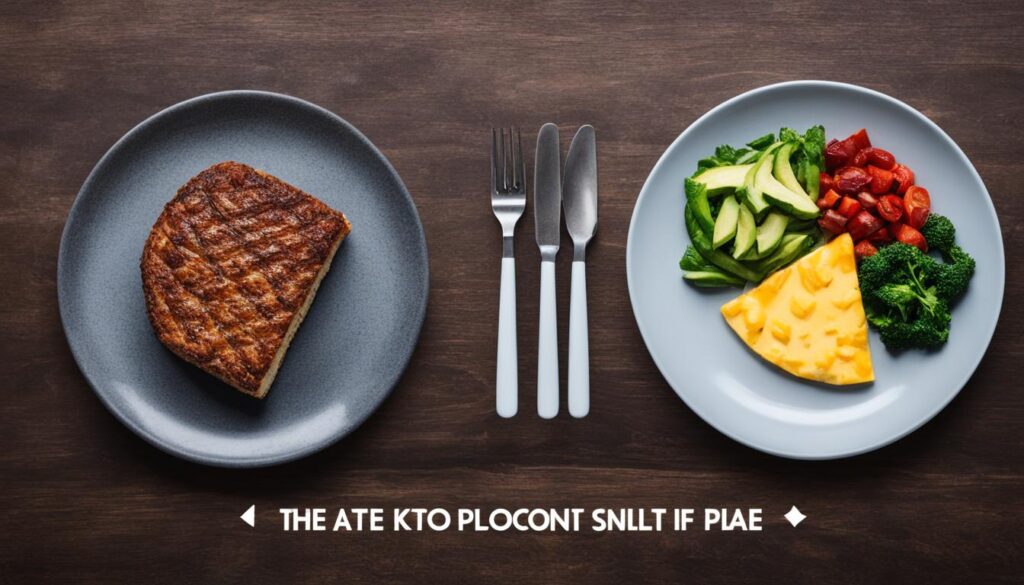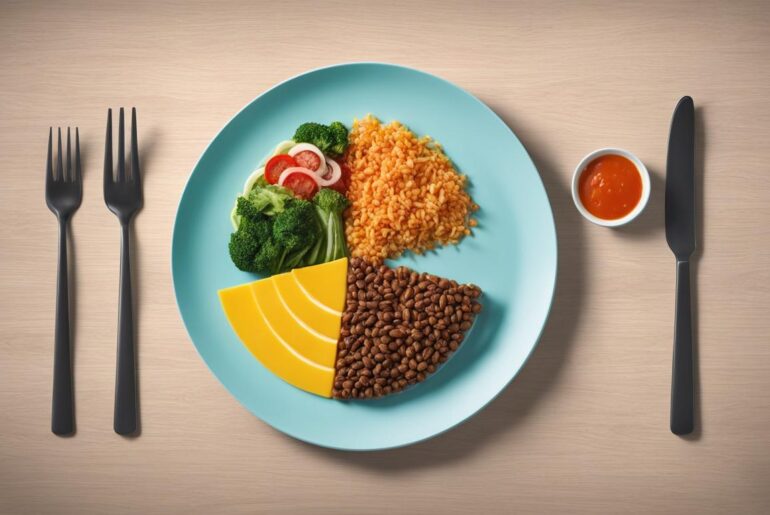When it comes to weight loss methods, there are various nutritional strategies to consider. Two popular approaches are the keto diet and portion control. In this article, I will compare these two methods and determine which one is better for achieving sustainable weight loss.
The keto diet, also known as the ketogenic diet, focuses on consuming high-fat foods while restricting carbohydrates. By doing so, it aims to put the body into a state of ketosis, where it uses stored fat as its primary source of energy. On the other hand, portion control emphasizes eating the right amount of food to create a calorie deficit for weight loss. It encourages mindful eating and listening to hunger cues.
Both the keto diet and portion control can be effective for weight management, but which method is better? Let’s delve deeper into the benefits and advantages of each approach to find out.
Key Takeaways:
- Both the keto diet and portion control can promote weight loss when practiced correctly.
- The keto diet focuses on high-fat, low-carbohydrate foods to induce ketosis.
- Portion control emphasizes mindful eating and regulating food intake.
- The keto diet may offer rapid initial results, but portion control offers a more sustainable approach.
- It’s important to choose the method that aligns with your goals, preferences, and lifestyle for sustainable weight management.
Understanding the Keto Diet
The keto diet, short for ketogenic diet, is a high-fat, low-carbohydrate eating plan that aims to put the body into a state of ketosis. In ketosis, the body switches from using glucose as its primary source of energy to using stored fat. This shift in metabolism is achieved by severely restricting carbohydrate intake and increasing fat consumption. By doing so, the body enters a state of calorie deficit, which promotes weight loss.
The key principles of the keto diet include:
- High-fat diet: The keto diet encourages the consumption of foods rich in healthy fats such as avocados, nuts, and olive oil.
- Low-carbohydrate diet: Carbohydrates, especially those found in refined sugars and grains, are limited in the keto diet. This helps reduce insulin levels and promote fat burning.
- Ketosis: By restricting carbohydrates, the body depletes its glycogen stores and starts producing ketones, which are used as an alternative fuel source.
- Calorie deficit: Like any weight loss method, the keto diet relies on creating a calorie deficit to promote fat loss.
It’s important to note that the keto diet may not be suitable for everyone. Consulting with a healthcare professional or registered dietitian is recommended before starting any new diet.
The Importance of Portion Control
When it comes to weight loss, portion control plays a crucial role in achieving success. By consciously regulating the amount of food consumed in each meal or snack, individuals can create a calorie deficit, which is essential for shedding those unwanted pounds. But portion control is more than just monitoring the quantity of food; it also promotes mindful eating, encourages listening to hunger cues, and helps develop healthy eating habits (check this post out).
Practicing portion control allows you to become more mindful of what and how much you eat. Rather than mindlessly consuming large portions, you become aware of the appropriate serving sizes for different food groups. This awareness enables you to make conscious decisions about portion sizes and avoid overeating, ultimately leading to a calorie deficit.
Another benefit of portion control is that it helps you tune in to your body’s hunger cues. Instead of eating out of habit or emotions, you learn to recognize genuine hunger and eat when your body truly needs nourishment. By listening to your hunger cues, you can avoid unnecessary snacking or indulging in larger portions than necessary, which can impede weight loss progress.
Developing Healthy Eating Habits
Portion control is not just a temporary fix for weight loss; it is a long-term approach that fosters healthy eating habits. By consistently practicing portion control, you develop a sense of discipline and balance in your diet. You learn to appreciate the right amount of food that satisfies your hunger without overdoing it. This habit contributes to a healthier relationship with food and creates a sustainable lifestyle that supports weight management.
To effectively implement portion control, consider using visual cues such as smaller plates and bowls to create the illusion of a fuller plate. Pre-portioning snacks into individual servings can also be helpful in preventing mindless snacking. Additionally, taking the time to savor and appreciate each bite can enhance your eating experience and promote feelings of satisfaction despite consuming smaller portions.
Ultimately, portion control is about finding the right balance between enjoying food and nourishing your body. It is a mindful approach to eating that not only supports weight loss but also cultivates healthy eating habits. Remember, sustainable weight loss is not about depriving yourself; it is about making informed choices and creating a calorie deficit through portion control and mindful eating.
| Benefits of Portion Control |
|---|
| Creates a calorie deficit for weight loss |
| Enhances mindfulness of eating habits |
| Helps listen to hunger cues and avoid overeating |
| Promotes a balanced approach to nutrition |
| Fosters a sustainable and healthier lifestyle |
Benefits of the Keto Diet

The keto diet offers a range of benefits, making it an effective approach for weight loss and overall well-being.
1. Weight Loss:
One of the primary benefits of the keto diet is its ability to promote weight loss. By consuming high-fat foods and reducing carbohydrate intake, individuals on the keto diet often experience a decrease in overall calorie intake. This calorie deficit can lead to significant and sustainable weight loss over time.
2. Increased Satiety:
Another advantage of the keto diet is its impact on satiety. The consumption of high-fat foods often leads to greater feelings of fullness and satisfaction. This increased satiety can help individuals maintain a reduced calorie intake and curb overeating, contributing to successful weight loss.
3. Improved Blood Sugar Control:
Research has shown that the keto diet can improve blood sugar control, particularly for individuals with diabetes or insulin resistance. By minimizing carbohydrate intake, the keto diet helps regulate blood sugar levels and reduces the need for insulin medication in some cases.
4. Reduced Inflammation:
Inflammation is a contributing factor to various health issues, including obesity. The keto diet has been found to have anti-inflammatory effects, potentially reducing inflammation and its associated risks. By adopting the keto diet, individuals may experience a decrease in chronic inflammation, leading to improved overall health.
Advantages of Portion Control
Portion control offers numerous advantages for weight loss and overall health. By practicing portion control, individuals can enjoy the benefits of flexible eating, balanced nutrition, long-term sustainability, and increased portion size awareness.
One of the key advantages of portion control is the ability to maintain a balanced and nutritious diet while still enjoying favorite foods. Unlike restrictive diets, portion control does not eliminate specific foods, allowing for flexibility and enjoyment in meal choices.
Portion control is sustainable in the long term and promotes portion size awareness. By being conscious of serving sizes, individuals can avoid overeating and make better choices about the quantity of food they consume.
Another advantage of portion control is the promotion of mindful eating habits. By paying attention to portion sizes and focusing on the act of eating, individuals can develop a better connection with their hunger cues and make more mindful choices about their food intake.
Emphasizing portion control in a weight loss routine encourages long-term sustainability. Unlike fad diets, portion control is a realistic and practical approach that can be maintained over time, leading to consistent and sustainable progress.
By practicing portion control, individuals gain a better understanding of their nutritional needs and achieve a balanced intake of macronutrients. This ensures that they provide their body with the right amount of energy and nutrients needed for optimal health and weight management.
In summary, portion control offers multiple advantages for weight loss and overall health. It allows for flexible eating, promotes balanced nutrition, sustains long-term behavior changes, and increases portion size awareness for mindful eating habits. By incorporating portion control into your lifestyle, you can achieve sustainable weight loss and improve your overall well-being.
Comparing Keto and Portion Control for Weight Loss
When comparing keto and portion control for weight loss, it’s important to consider individual preferences and lifestyle compatibility. Both strategies can be effective in promoting weight loss when practiced correctly.
“The keto diet may offer rapid initial results due to its ability to induce ketosis, but portion control provides a more sustainable approach that can be maintained long-term.”
The keto diet, with its emphasis on consuming high-fat foods and restricting carbohydrates, can lead to rapid weight loss by inducing ketosis (check out my post on rapid weight loss here). Ketosis is a metabolic state where the body uses stored fat for energy instead of glucose. However, sustaining the keto diet can be challenging for some individuals due to its strict restrictions and potential side effects.
On the other hand, portion control focuses on eating the right amount of food to create a calorie deficit. It encourages mindful eating, listening to hunger cues, and developing healthy eating habits. Portion control offers a more flexible approach, allowing individuals to enjoy a balanced diet while still achieving weight loss goals.
Ultimately, the choice between keto and portion control depends on personal preferences and lifestyle compatibility. Some people may prefer the rapid initial results of the keto diet, while others may find portion control to be a more sustainable and manageable approach. It’s crucial to choose the method that aligns with your goals, preferences, and lifestyle to achieve sustainable weight loss.
Remember, the key to successful weight loss is finding a strategy that you can maintain in the long term. Whether it’s keto, portion control, or another method entirely, consistency and adherence are key for sustainable results.
| Keto Diet | Portion Control | |
|---|---|---|
| Approach | High-fat, low-carbohydrate | Regulating food intake |
| Weight Loss Effectiveness | Rapid initial results | Steady and sustainable |
| Lifestyle Compatibility | Strict restrictions, potential side effects | Flexible, manageable |
| Long-term Sustainability | Challenging for some individuals | More sustainable and manageable |
| Individual Preferences | May appeal to those seeking quick results | Allows for more food variety and flexibility |
Tips for Implementing Keto or Portion Control

Implementing a keto diet or practicing portion control can be challenging but highly beneficial for weight management. Here are some practical tips to help you succeed:
Tips for the Keto Diet:
- Plan your meals: Meal planning is crucial for the keto diet to ensure you have the right balance of fats, proteins, and carbohydrates.
- Track your macros: Keep a food diary or use a tracking app to monitor your macronutrient intake and stay within your desired keto ratios.
- Maintain portion size awareness: Although the focus is on fats, be mindful of portion sizes to avoid overeating and maintain a calorie deficit.
- Choose healthy fats: Opt for natural sources of fat like avocados, nuts, and olive oil rather than processed and unhealthy fats.
- Mindful eating: Practice mindful eating to enhance your enjoyment of each keto-friendly meal and develop a positive relationship with food.
Tips for Portion Control:
- Practice mindful eating: Slow down and savor each bite, paying attention to your hunger and fullness cues.
- Use smaller plates and bowls: Trick your mind into feeling satisfied with smaller portions by using smaller plates and bowls.
- Plan your meals: Plan your meals and portion them out in advance to avoid overeating or mindless snacking.
- Create balanced meals: Ensure that each meal includes a balance of protein, vegetables, whole grains, and healthy fats.
- Stay hydrated: Drink plenty of water throughout the day to help control cravings and maintain portion control.
By following these tips, you can successfully embrace either the keto diet or portion control to achieve your weight management goals. Remember to consult with a healthcare professional or registered dietitian before making any significant changes to your diet.
Conclusion
In conclusion, both the keto diet and portion control can be effective strategies for weight loss and achieving long-term, sustainable results. The keto diet, with its high-fat, low-carbohydrate approach, allows the body to enter a state of ketosis and burn stored fat for energy. On the other hand, portion control focuses on mindful eating and regulating food intake, creating a calorie deficit for weight loss.
The choice between the keto diet and portion control ultimately depends on individual preferences and lifestyle compatibility. Some people may find the strict restrictions of the keto diet challenging to maintain in the long term, while others may thrive on its high-fat foods. Portion control, on the other hand, offers a more balanced approach to nutrition, allowing for flexibility and enjoyment of a variety of foods.
For sustainable weight loss, it’s crucial to find a method that aligns with your goals and is maintainable in the long term. Consider your personal preferences, lifestyle, and relationship with food when choosing between the keto diet and portion control. Remember that balance is key, and a sustainable approach is more likely to lead to successful weight management over time (check out my post on successful weight management here).




